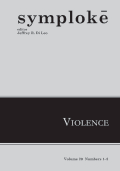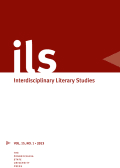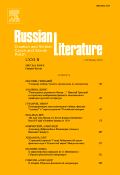
Slovenska Literatura
Scope & Guideline
Cultivating a Global Perspective on Slovak Literary Works
Introduction
Aims and Scopes
- Literary Historical Research:
The journal emphasizes the historical development of Slovak literature, exploring key authors, movements, and the socio-political contexts that have influenced literary production over time. - Cultural and Interdisciplinary Studies:
A focus on the interplay between literature and other cultural forms, including visual arts, music, and cinema, as well as the examination of multilingualism and cross-cultural influences in Slovak literary works. - Theoretical Contributions and Criticism:
The journal publishes theoretical analyses and critical reflections on literary texts, including narratology, feminist theory, psychoanalysis, and other contemporary literary theories. - Contemporary Literature and Poetics:
An exploration of contemporary Slovak literature, including emerging authors and avant-garde movements, with a focus on innovative poetic forms and narrative techniques. - Translation Studies:
Investigation into the role of translation in shaping Slovak literature and its reception, particularly in the context of multilingualism and cultural exchange.
Trending and Emerging
- Body and Physicality in Literature:
An increasing number of papers focus on themes of corporeality, motherhood, trauma, and the representation of the body in literature, reflecting broader societal discussions around identity and the human experience. - Feminist and Gender Studies:
There is a notable rise in feminist literary criticism and gender studies, emphasizing the roles and representations of women in Slovak literature, as well as critiques of traditional narratives and the exploration of intersectional identities. - Multilingualism and Transnational Perspectives:
Emerging themes related to multilingualism and the complexities of cultural identity in a globalized context are gaining traction, showcasing the diverse linguistic backgrounds of Slovak authors and their works. - Theoretical Innovations:
Recent publications indicate a growing interest in innovative theoretical frameworks, including narratology, intertextuality, and cognitive literary science, which are being applied to contemporary Slovak literature. - Socio-political Contexts and Contemporary Issues:
There is an evident trend towards examining literature in relation to current social issues, including migration, nationalism, and existential themes, reflecting the dynamic interplay between literature and contemporary societal concerns.
Declining or Waning
- Traditional Literary Genres:
There has been a noticeable decline in the examination of traditional literary genres such as epic and lyric poetry from earlier centuries, suggesting a shift towards more contemporary forms and experimental literature. - Historical Literary Figures:
While there remains interest in historical figures, the frequency of papers focused exclusively on classical authors from the 19th and early 20th centuries has decreased, possibly due to a greater emphasis on modern and contemporary literature. - Regional Literary Studies:
The focus on regional literature specific to geographic areas within Slovakia, such as Vojvodina Slovak literature, appears to be waning, as the journal increasingly prioritizes broader thematic and theoretical concerns. - Occasional Poetry:
The exploration of occasional poetry, particularly from the 16th to 18th centuries, has seen reduced representation, indicating a potential shift towards more universal themes and narratives in contemporary literary studies.
Similar Journals

REVISTA CHILENA DE LITERATURA
Championing open access to literary insights.REVISTA CHILENA DE LITERATURA, published by Universidad de Chile, Facultad de Filosofía y Humanidades, is a premier open-access journal that has been at the forefront of literary scholarship since its inception in 2004. With its ISSN 0718-2295, the journal focuses on a wide array of topics within the field of literature and literary theory, striving to foster intellectual discourse and innovation. It has gained notable recognition, reflected in its Q2 category ranking in 2023, positioning it among the top journals in its field within the Scopus database, where it ranks #513 out of 1106 journals, placing it in the 53rd percentile. Hailing from Chile, the journal also serves as a vital platform for researchers and students to disseminate their work, enhancing the global dialogue in literature. With a history of convergence from 2007 to 2023, REVISTA CHILENA DE LITERATURA is committed to advancing literary research and its implications in contemporary contexts, making it an essential resource for anyone engaged in literary studies.

Symploke
Innovating Scholarship Through Diverse PerspectivesSymploke, published by University of Nebraska Press, is a leading interdisciplinary journal in the fields of literary and cultural studies that aims to foster dialogues across a diverse range of scholarly perspectives. With its ISSN 1069-0697 and E-ISSN 1534-0627, the journal is committed to publishing high-quality research that examines the intersections of literature, philosophy, and social theory. As a prominent platform for innovative scholarship, Symploke plays a crucial role in advancing critical discourse, making it an essential resource for researchers, professionals, and students alike. The journal provides unrestricted access to its valuable content, thereby ensuring the dissemination of knowledge without barriers. With an emphasis on in-depth analyses and theoretical contributions, Symploke continually seeks to expand the horizons of contemporary thought and offers a vital forum for voices within the academic community.

LITERATUR UND KRITIK
Nurturing Critical Perspectives in LiteratureLITERATUR UND KRITIK, published by Otto Muller Verlag, stands as a significant journal in the field of Literature and Literary Theory. This Austrian journal, with its ISSN 0024-466X, offers a platform for critical examination, analysis, and discourse on literature from various historical and cultural contexts. Despite its current standing in the Q4 category of literature rankings, it provides an invaluable resource for researchers and practitioners committed to exploring the evolving landscape of literary criticism. This journal is particularly notable for its convergence of scholarly thought from 2009 to 2024, fostering a rich dialogue among academics, critics, and students alike. While it does not offer open access, its valuable insights into contemporary and historical literary studies make it a respected source within the academic community. The journal ensures that contributors and readers alike engage deeply with significant literary themes, nurturing both scholarly and creative pursuits.

Interdisciplinary Studies of Literature
Illuminating Diverse Perspectives in Literary TheoryInterdisciplinary Studies of Literature is a premier academic journal dedicated to advancing the field of literature and literary theory, published by KNOWLEDGE HUB PUBL CO LTD in China. Since its inception in 2017, this journal has consistently offered a vibrant platform for scholarly discourse, hailing from a prestigious Q1 ranking in the Literature and Literary Theory category, reflecting its commitment to high-quality research. With a Scopus rank of #455 out of 1106 in the Arts and Humanities category and a standing in the 58th percentile, this journal embraces diversity in literary studies while fostering interdisciplinary connections to critical theories and practices. Academics, researchers, and students alike will find valuable insights and innovative perspectives within its pages, making it an essential resource for those engaged in literary analysis and theory. Engaging with this journal not only enriches understanding but also promotes the evolution of literary discourse globally.

Interdisciplinary Literary Studies
Unveiling the Multifaceted Dimensions of Literary TheoryInterdisciplinary Literary Studies is a prominent journal published by Penn State University Press that delves into the rich and diverse field of literature and literary theory. Established to foster scholarly dialogues, this journal embraces an interdisciplinary approach, making it a valuable resource for researchers, practitioners, and students interested in the multifaceted dimensions of literature. With an ISSN of 1524-8429 and an E-ISSN of 2161-427X, the journal operates without open access, reflecting its commitment to maintaining rigorous academic standards. The journal is ranked in the Q3 quartile of literature and literary theory for 2023 and holds a Scopus rank of #730 out of 1106, placing it in the 33rd percentile, which further emphasizes its emerging stature within the academic community. Spanning converged years from 2017 to 2024, Interdisciplinary Literary Studies continues to impact the dialogue within the humanities, encouraging nuanced analyses and interdisciplinary connections that push the boundaries of literary scholarship. Set in the United States, the journal is dedicated to exploring contemporary and historical texts, critical theories, and diverse literary forms, making it an essential publication for anyone passionate about the evolving landscape of literature.

Valenciana
Driving transformative ideas in an open access landscape.Valenciana is an esteemed, peer-reviewed journal published by the University of Guanajuato, dedicated to advancing scholarly discourse in the fields of humanities and social sciences. Since its inception in 2008, this Open Access journal has facilitated unrestricted access to high-quality research, fostering collaboration and innovation among researchers, professionals, and students. With an ISSN of 2007-2538 and an E-ISSN of 2448-7295, Valenciana is committed to publishing original research, reviews, and theoretical contributions that illuminate contemporary issues and cultural phenomena. The journal not only serves as a platform for emerging voices in academia but also enhances its visibility in the global research landscape, driving interdisciplinary dialogue and engagement. Situated in Guanajuato, Mexico, Valenciana embraces the rich academic heritage of the region while also appealing to a broader audience, making it a vital resource for those seeking to explore new ideas and perspectives in their respective fields.

RUSSKAIA LITERATURA
Advancing Scholarship in the Realm of Russian LiteratureRUSSKAIA LITERATURA, published by the esteemed Russian Academy of Sciences and the State Academy of Humanities (GAUGN), is a prominent journal dedicated to the exploration and analysis of Russian literature and literary theory. Since its inception in 2013, the journal has established itself within the academic community as a valuable resource for scholars and students alike, aiming to elevate discourse and critical thought in the field. Although currently categorized in Q4 of Literature and Literary Theory by Scopus, it plays a significant role in fostering a deeper understanding of Russian literary heritage. The journal's commitment to rigor and quality is underscored by its inclusion in internationally recognized databases, making it a relevant venue for contemporary literary scholarship. Researchers and practitioners in the field will find RUSSKAIA LITERATURA an indispensable tool to access vital knowledge and contribute to discussions that resonate within and beyond the Russian context.

RUSSIAN LITERATURE
Advancing Critical Insights into Russian LiteratureRUSSIAN LITERATURE is a premier academic journal published by ELSEVIER, dedicated to advancing the study of Russian literary traditions, critical theory, and cultural contexts. With an ISSN of 0304-3479 and an E-ISSN of 1878-3678, this journal has firmly established itself as a vital resource in the field, achieving a commendable Q1 ranking in Literature and Literary Theory as of 2023. The journal benefits from a strong impact factor and ranks #178 out of 1106 in the Scopus database, placing it in the 83rd percentile of arts and humanities research. RUSSIAN LITERATURE covers an extensive timeline, converging years from 1971 to 1974 and from 1976 to 2023, reflecting its rich academic lineage. Although not an open-access publication, the journal remains influential among scholars, professionals, and students seeking in-depth analyses and critical insights into Russian literature and literary theory. Its commitment to scholarly rigor makes it an essential read for anyone engaging with the complexities of literary studies.

CAMBRIDGE QUARTERLY
Exploring the Depths of Literary InquiryCAMBRIDGE QUARTERLY, published by Oxford University Press, stands as a dedicated outlet for scholarly discourse in the realm of Literature and Literary Theory. Since its inception in 1965, this journal has fostered a rich landscape for academic inquiry and discussion, with a commitment to exploring the intricate dynamics of literary studies up to 2024 and beyond. With an ISSN of 0008-199X and an E-ISSN of 1471-6836, CAMBRIDGE QUARTERLY offers a platform for innovative research, although it currently does not provide open access options. The journal is noted for its scholarly contributions, ranking in the Q4 quartile within its category based on the 2023 metrics, and holds the 635th rank in Scopus for Arts and Humanities specifically focused on Literature and Literary Theory, placing it in the 42nd percentile. As such, it appeals to researchers, professionals, and students alike, seeking to deepen their understanding of literary discourse and theoretical frameworks.

JOURNAL OF MODERN LITERATURE
Exploring the Depths of Modern Literary DiscourseJOURNAL OF MODERN LITERATURE, published by Indiana University Press, is a distinguished peer-reviewed journal that delves into critical examinations of modern literary texts and theories. Since its inception, the journal has served as a vital platform for scholars dedicated to the exploration of contemporary literature, making significant contributions to the discourse within the field. With an impressive ranking of Q2 in the Literature and Literary Theory category as of 2023, it positions itself among the top-tier journals in its domain, reflecting its strong impact within academic circles. This journal not only fosters scholarly dialogue but also embraces innovative approaches to literary criticism, ensuring relevance in today’s dynamic cultural landscape. Researchers, professionals, and students will find a rich repository of articles that engage with various modern literary paradigms, enhancing their understanding and appreciation of the intricate relationships between literature and broader socio-cultural contexts. Though it does not operate under an open access model, the journal's extensive reach through its digital ISSN (1529-1464) and print ISSN (0022-281X) allows for valuable insights to be disseminated to the appropriate audiences.